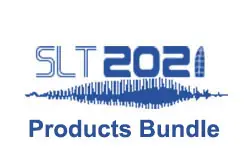Voxlingua107: A Dataset For Spoken Language Recognition
J枚rgen Valk, Tanel Alum盲e
-
Members: FreeSPS
IEEE Members: $11.00
Non-members: $15.00Length: 0:15:00
19 Jan 2021
This paper investigates the use of automatically collected web audio data for the task of spoken language recognition. We generate semi-random search phrases from language-specific Wikipedia data that are then used to retrieve videos from YouTube for 107 languages. Speech activity detection and speaker diarization are used to extract segments from the videos that contain speech. Post-filtering is used to remove segments from the database that are likely not in the given language, increasing the proportion of correctly labeled segments to 98%, based on crowd-sourced verification. The size of the resulting training set (VoxLingua107) is 6628 hours (62 hours per language on the average) and it is accompanied by an evaluation set of 1609 verified utterances. We use the data to build language recognition models for several spoken language identification tasks. Experiments show that using the automatically retrieved training data gives competitive results to using hand-labeled proprietary datasets. The dataset is publicly available.



